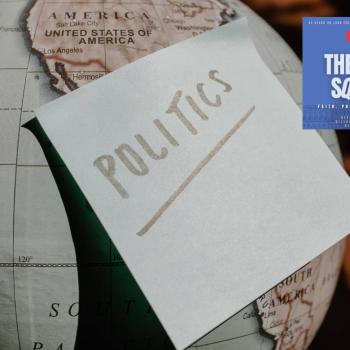
I apologize for it taking me so long to comment on the most recent school shooting. Frankly, I didn’t even know what the hell to say. But, after some reflection, what became clear to me was, instead of just talking about the shooting directly, I needed to first say something about what it means to be a follower of Jesus, what it means to be “in the world, not of the world.” Hopefully by the end of this piece, it will make sense as to why.
Now, in order to even grasp what this means, we have to figure out what “being of the world” means. Then we can work backwards and attempt to discern what it would mean to live in the world without being “of” it.
Of the World
So, what does it mean to be “of the world?” Or, to ask it another way: How does the world structure itself?
If we go all the way back to before Socrates, we’ll hear how the world is principally structured through violence, and that, according to the philosopher Heraclitus, “War is the father of all and the king of all.” Our ancient founding murder myths follow a similar line of thinking: Rome is founded immediately after Romulus kills Remus; Thebes is founded immediately after Cadmus kills a dragon and a group of armed warriors; and Enoch is founded immediately after Cain strikes down Abel.
So, it’s pretty clear: There is ample evidence that civilization is founded on blood.
It seems that Jesus noticed the same exact thing. In Luke 11, after giving a group of Pharisees and lawyers a royal tongue-lashing, he says to them: “I will send them prophets and apostles, some of whom they will kill and persecute, so that this generation may be charged with the blood of all the prophets shed since the foundation of the world, from the blood of Abel to the blood of Zechariah.” What I think Jesus is getting at is this: all violence can be traced to the founding of civilization. And it continues to be to this day.
That being said, civilization-structuring violence is not done for the sole sake of doing it. No! It has a purpose, and, paradoxically, that purpose is peace.
Allow me to explain.
You see, violence, at least mediated violence, is like the Greek pharmakon, both the poison and the medicine. What it succeeds in doing, at least decently (and only for a time), is it protects us against all-against-all violence, or in other words, unmediated violence. You know, the sort of violence that was going on right before the flood wiped everyone out sans Noah and his immediate family. Or, the sort of violence that was feared in the first century, as the high priest Caiaphas acknowledged: “You do not understand that it is better for you to have one man [Jesus] die for the people than to have the whole nation destroyed.” What he is admitting, perhaps without even really understanding it, is that a little bit of unified violence against a surrogate “other” has the power to spare the people from much broader violence (in this case, at the hands of the Romans).
However, this mediated violence against our plenitude of scapegoats only kicks the can down the road, so to speak. And as the can of violence gets kicked further and further along, things build and build until, ultimately, the whole damn thing explodes under all the built-up pressure.
So, how do we stop this trend? We live in it by repenting of it.
In the World
To my mind, in order to truly be a “follower of Christ,” we must, first and foremost, repent of our propensity to scapegoat, to create victims, to unify around an “other.” In other words, we must change our mind about mediated violence and realize that this solution is really no solution at all. When we take the Eucharist, for instance, we are acknowledging, first and foremost, that we are cannibalistic by nature, that we have been devouring each other, day after day, since the foundation of the world. Even our best intentions have fallen prey to this. The Meal and the Table, however, represents the end of such ways for us who take it. Instead of coming together around the breaking of bodies and the spilling of blood—which is what we’ve been doing seemingly forever—the path forward involves coming together over bread and wine, forgiveness and mercy pervading from our lips, at all times and in all circumstances.
This seems to be the very point being driven home in the Sermon on the Mount. Here, Jesus isn’t putting forth some impossible ethical standards that none of us can achieve. Instead, he is, in word and in deed, modelling for us exactly how to live in the world without being of it: by praying for those who persecute us (Matthew 5:44); by blessing those who curse us (Luke 6:28); by turning the other cheek when we are struck (Matthew 5:39), and so on.
Then, Jesus ties in the ethical and the anthropological with the theological: “Be perfect, therefore, as your heavenly Father is perfect” (Matthew 5:48). And again: “Be merciful, just as your Father is merciful” (Luke 6:36). So, in other words, the reason we live out the Sermon on the Mount is because that is what the Father is like. We love our enemies because the Father loved us, even when we declared ourselves his enemy. As Paul once put it: “God proves his love for us in that while we still were sinners Christ died for us” (Romans 5:8).
Tying It All Together
Based on what I’ve said above, I’m certain that for many, the following question has already been raised: Am I really advocating for Christians to passively lie down like doormats whilst violence is done to us and our children? Is that what it means to be “in the world, but not of the world?”
No, of course not! We must actively do something about, not only gun violence, but all violence.
But what?
If I’m being perfectly honest, I’m not exactly sure. I have some ideas, which we’ll get to, but first I have to admit that there is simply not going to be a one-size-fits-all answer. There will probably need to be a whole plethora of ideas implemented—and I’m guessing some will work better than others. Whatever we come up with, however, what those of us who call ourselves Christians must remember is that we can’t simply do things the way we’ve been doing them since the foundation of the world. That is to say, we are going to have to really push for doing things nonviolently, being in the violent world, not of the violent world.
Now, as promised, let me conclude with two ideas as to how we can decrease gun violence. You’ll probably notice that I’ve purposely left off my thoughts on things like the 2nd Amendment and gun-control laws. Why did I do this? Well, put simply: most of us already have our minds made up on these things, and nothing I say will sway anyone one iota. In fact, it may only cause more division. What I will say is that, personally, I laid my guns down many years ago, regardless of my supposed right to “bear arms,” regardless of any law the State can conjure up. But, that’s me; that’s how I have come to interpret what it means to be in the world, not of the world.
-
End the War on Drugs
To my mind, there is simply no better way to reduce gun violence than to end the disastrous Drug War (how we didn’t learn from alcohol prohibition is beyond me). Not only does it have a history of ripping families apart, thereby rendering those left behind perpetually impoverished, but it has also contributed to the gang problem in this country (and, approximately 13% of all homicides are gang-related). As Newsweek’s Thomas J. Eckert writes:
“Drug trafficking brings in as much as $750 billion in the US each year. Much of that money goes to gangs which have immersed themselves from start to finish in creating, smuggling, and selling drugs throughout the country. If you purchase drugs in any major city in the US, chances are, they have passed through a gang at some point. Combine this with gangs’ inability to resolved disputes through the courts and other non-violent means, and it becomes obvious why gangs, gun violence, and drug culture are so entwined.”
So, if you want less violence—including State-initiated violence against nonviolent drug offenders—advocate for ending the War on Drugs.
That brings me to my next idea:
-
Change the Justice System
There multiple signs that Nikolas Cruz, the Florida school shooter, was a time-bomb waiting to happen. In fact, he even went so far as to threaten to kill an ex-girlfriend’s new boyfriend last year and was never charged. He should have been. He was also known to the FBI for things he said on social media and nothing was ever done. It should have been.
But I get it. The justice system is so inundated with locking up nonviolent drug offenders—who make up 46% of the prison population—that it can barely keep its head above water. And so, folks like Cruz get passed by and forgotten . . . until they do something like what happened the other day.
So, how do we change this so that less violence occurs? Well, if you want a working model to copy, check out this article about the Netherlands’ prison “problem”; where their only problem is that there aren’t enough criminals to fill the beds. It’s a beautiful way to see how the restorative justice model—where human lives are placed before the almighty dollar (or Euro)—totally trumps the retributive one. If this were our system, perhaps we would have been more inclined to do something about Cruz before it was too late, and perhaps he wouldn’t have slipped through the cracks.
*I’m sure you have other ideas as to how we can start to see less violence on our streets and in our schools. I’d like to hear about them, even if we won’t end up agreeing. Like I said, we’ll need lots of ideas—and I’ve heard things range from a total ban on AR-15s and implementing universal background checks (which most people actually want to see happen), all the way to arming teachers in our schools (yikes!). So long for now.













